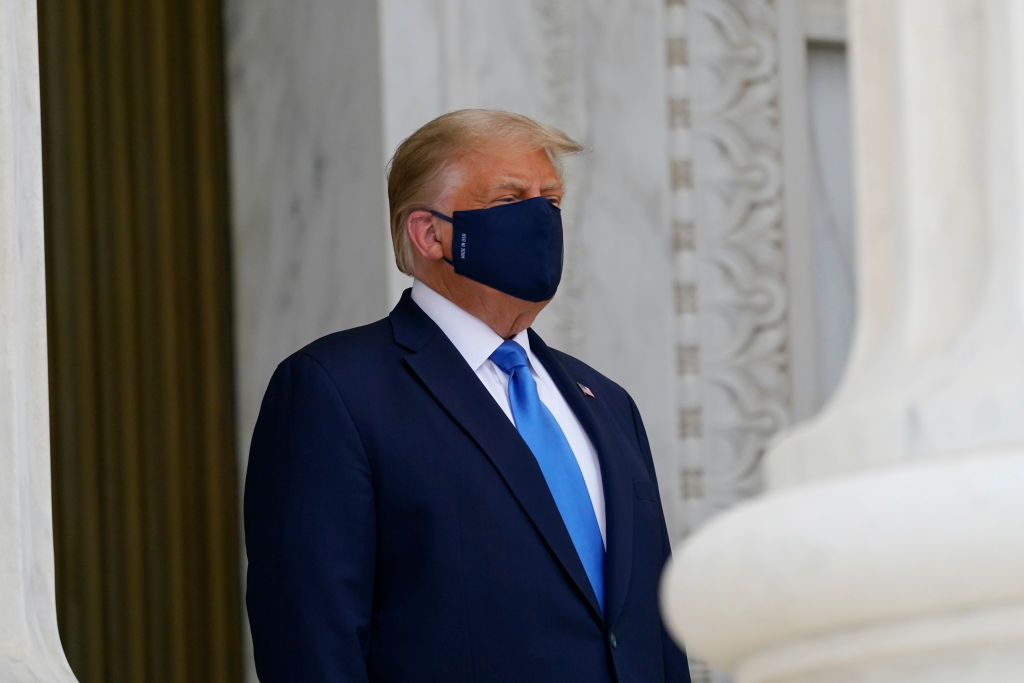I had never heard of Regeneron or its antibody cocktail before 11pm last night, at which point we learned the President had taken a dose of the experimental drug. So I wanted to preface what follows with: “deeply uncertain”. Here are a few thoughts.
First, it looks like a promising treatment. It is a combination of two antibodies, the proteins your body produces to attack pathogens. They bind to and destroy the spike protein on the outside of the virus.
The only study I’m aware of is quite small (275 patients) and is not, as far as I can tell, publicly available. I can find two promising studies (1, 2) in mice, but the most recent study looking at viral load in humans only appears to be available as an (admittedly fairly in-depth) press release and some powerpoint slides – if I find the real thing I’ll add it in here.
What the press release says is that patients using Regeneron’s cocktail (REGN-COV2) had reduced viral load and recovered from their symptoms faster. Before the trial, patients were given a serology test, and divided into two groups: those who had produced viral antibodies of their own (seropositive) and those who hadn’t (seronegative). Then they were given either a high dose of REGN-COV2, a low dose, or a placebo.
A sample of 275, subdivided into six groups (three different treatments for the seronegative and the seropositive groups) means an effective sample size of only about 45, so it’s pretty small, and should be treated with caution. But, that said, it does seem to have real effects, especially in the seronegative group. The amount of virus in patients’ bloodstream was reduced by between 50% and 99%. The treatment group also seemed to recover from their symptoms faster, but those results weren’t statistically significant. Babak Javid, an infectious diseases specialist at the University of California San Francisco, told me: “The data I’ve seen thus far suggests it’s very potent at reducing viral load, so it’s a very good anti-viral.
“There aren’t any data yet on ‘outcome’, i.e. how patients do, in a randomised trial. But I can say that if I could have any drug, in the context of an early diagnosis, I would take this cocktail.”
So it’s certainly promising. And much larger clinical trials are now underway both in the US and here in the UK. What interests me is the idea that it should be made available to the US President before it is made ready. As Tyler Cowen says, apparently there are no significant risks of side effects, but the FDA would not let anyone else use it and in fact would prosecute any doctors who offered it to ordinary people, which seems perverse.
If the drug is safe enough to give to President Trump, then it seems bizarre that it is not safe enough to use elsewhere; and if it’s not safe enough to use elsewhere, then it’s bizarre that it’s safe enough to give to President Trump. So either the FDA is denying people the use of a safe and potentially effective drug, or it is endangering the President by allowing him to be prescribed a dangerous one. (Or, more reasonably, it is letting the President make decisions about the level of risk he is comfortable taking which they would not let the general public take.) None of that seems fair, to me.











Join the discussion
Join like minded readers that support our journalism by becoming a paid subscriber
To join the discussion in the comments, become a paid subscriber.
Join like minded readers that support our journalism, read unlimited articles and enjoy other subscriber-only benefits.
Subscribe